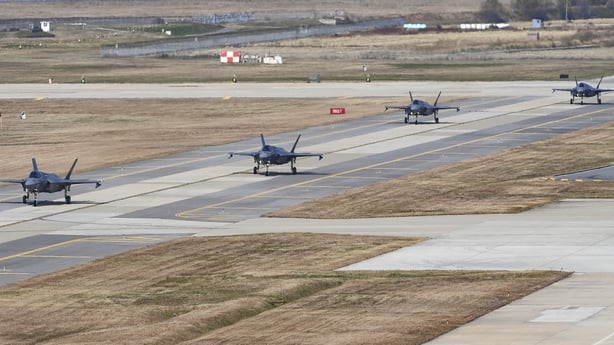United Nations Secretary General Antonio Guterres has condemned North Korea's recent missile launches, urging Pyongyang to "immediately desist from taking any further provocative action" and take immediate steps to resume talks aimed at the denuclearisation of the Korean Peninsula, a UN spokesperson has said.
Mr Guterres also "asks all parties concerned to come together and foster an environment that is conducive to dialogue," Stephane Dujarric said.
South Korea's military earlier scrambled stealth jets after detecting the mobilisation of 180 North Korean warplanes, Seoul said, following a record-breaking blitz of missile tests by Pyongyang this week.
It comes a day after North Korea conducted a failed intercontinental ballistic missile test and follows a decision by Seoul and Washington to extend through tomorrow their largest-ever joint air drills, a military exercise that has infuriated Pyongyang.
"Our military detected around 180 North Korean warplanes" mobilised in Pyongyang's airspace, Seoul's Joint Chiefs of Staff said.
It added that Seoul "scrambled 80 fighter jets including F-35As" while jets involved in the joint drills were also "maintaining readiness".
Shortly after South Korea announced the decision to extend the joint drills, Pyongyang launched three more short-range ballistic missiles, calling the decision "a very dangerous and wrong choice".
Hours later, the North fired 80 artillery rounds that landed in a maritime "buffer zone", Seoul's military said.
The barrage was a "clear violation" of the 2018 agreement that established the buffer zone in a bid to reduce tensions between the two sides, Seoul's Joints Chiefs of Staff said.
The artillery fire came after Pyongyang fired about 30 missiles Wednesday and yesterday, including an intercontinental ballistic missile.
One projectile also landed near South Korea's territorial waters for the first time since the end of the Korean War in 1953.
US Defense Secretary Lloyd Austin described Pyongyang's ICBM launch as "illegal and destabilising", and Seoul and Washington vowed to pursue new measures to demonstrate their "determination and capabilities" against the North's growing threats.

Experts and officials have said Pyongyang is ramping up its tests in protest over the US-South Korean drills.
Washington and Seoul have repeatedly warned that Pyongyang's recent launches could be a precursor to a nuclear test, which would be its seventh.
Pyongyang has called the joint air drills, dubbed Vigilant Storm, "an aggressive and provocative military drill targeting" North Korea.
It has threatened that Washington and Seoul would "pay the most horrible price in history" if it continued.
North Korea is particularly sensitive about the air drills, experts say, as its own airforce is one of the weakest links in its military, lacking high-tech jets and properly trained pilots.
Seoul last scrambled fighter jets in early October, when it detected 12 North Korean warplanes conducting an apparent air-to-surface firing drill.
The ongoing joint drills involve some of South Korea and America's advanced fighter jets - F-35As and F-35Bs, both of which are stealth aircraft designed to produce as small a radar signature as possible.
Such jets "would be a central component in any decapitation operations targeting the North Korean leadership including Kim Jong-un himself," said Go Myong-hyun, researcher at the entrance to Asan Institute for Policy Studies.
"We know for a fact that North Korea is highly sensitive to these kinds of threats."
This summer there were reports that US and South Korean commandos were practising so-called "decapitation strikes" - the removal of North Korea's top leadership in a lightning-fast military operation.

